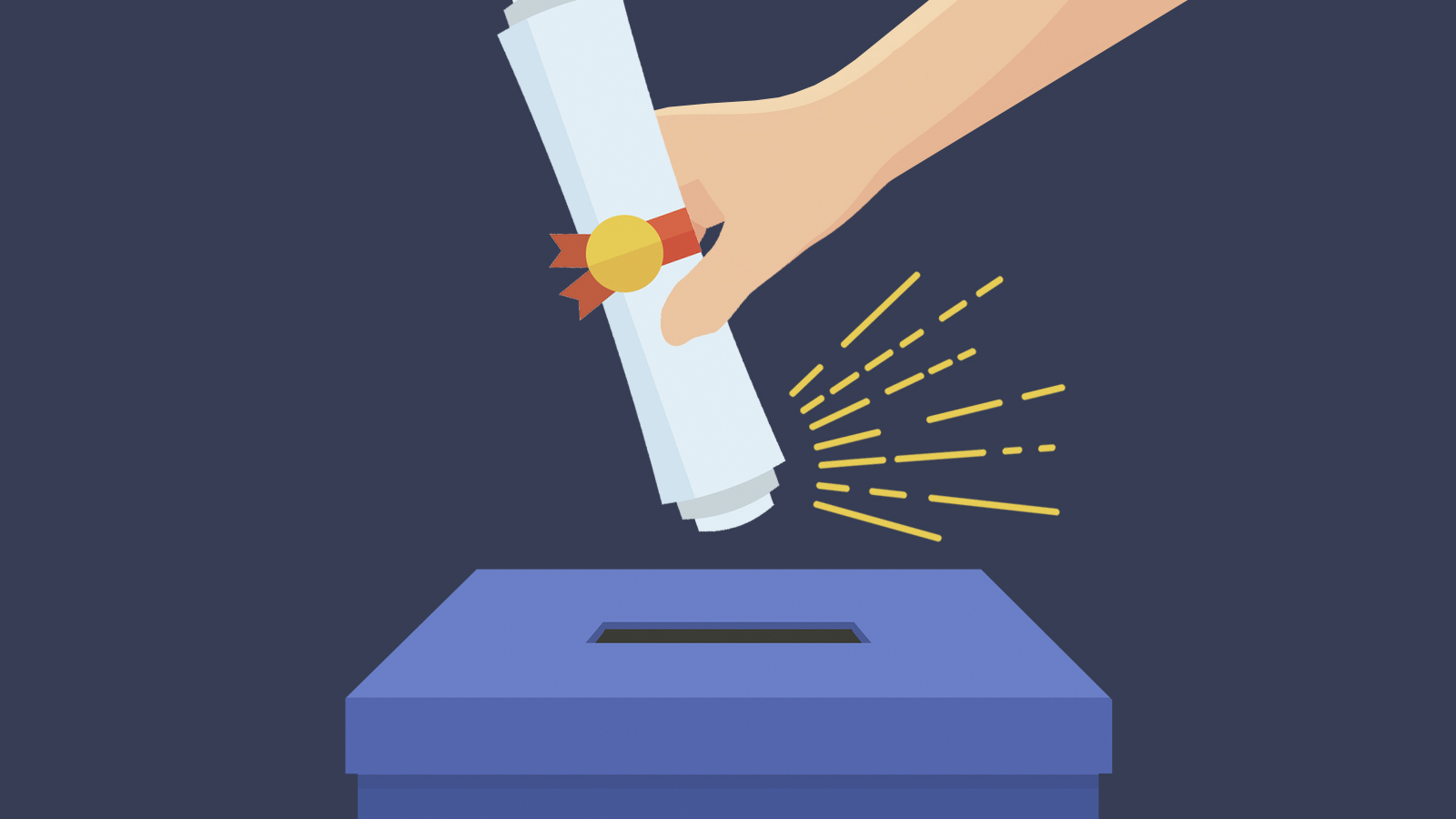Free college is how Democrats could actually rig elections


A free daily email with the biggest news stories of the day – and the best features from TheWeek.com
You are now subscribed
Your newsletter sign-up was successful
"The Democrats want to invite caravan after caravan of illegal aliens into our country," then-President Donald Trump said at a rally shortly before the 2018 midterm elections. "And they want to sign them up for free health care," he continued," plus "free welfare, free education, and for the right to vote."
That last bit — that Democrats support looser immigration policies or even illegal immigration because they believe immigrant votes will help them win elections — has become a common Republican accusation. Sen. Ted Cruz (R-Texas) was recorded making essentially the same argument in a call with state lawmakers earlier this year. A voting bill in Congress has the sole objective of "ensur[ing] that Democrats can never again lose another election," Cruz said, and that objective will be achieved in part by allowing "illegal aliens" to vote.
There are many problems with this claim, including that Trump gained support in 2020 in "many areas with large populations of Latinos and residents of Asian descent, including ones with the highest numbers of immigrants," and that there is no good reason to believe any significant number of noncitizens vote in federal elections.
The Week
Escape your echo chamber. Get the facts behind the news, plus analysis from multiple perspectives.

Sign up for The Week's Free Newsletters
From our morning news briefing to a weekly Good News Newsletter, get the best of The Week delivered directly to your inbox.
From our morning news briefing to a weekly Good News Newsletter, get the best of The Week delivered directly to your inbox.
But let's say, for the sake of argument, that Democrats are attempting a grand conspiracy to illicitly grow their voter rolls via some apparently unrelated federal policy. If so, they may have a better option than immigration law: college. Not post hoc loan forgiveness, but tuition-free education or enticements to enroll.
The persistent stereotype in U.S. politics is that party splits run along income lines: Rich people are Republicans, while poor and working-class people plus a tiny but visible media elite are Democrats. That was roughly fair decades ago, but it's not anymore. Now, the big divide is education. In most Western democracies, it's education plus income, but here in the States, education matters most:
Five decades ago, high-education voters leaned right and low-education voters left. That pattern is now reversed.
This phenomenon is called the "diploma divide," and it's been widening for a while, especially among white Americans. It grew again in 2020. There's no simple causal relationship between going to college and voting for Democrats, of course, but there's a strong enough correlation to suggest expanded college access would mean more Democratic votes.
A free daily email with the biggest news stories of the day – and the best features from TheWeek.com
Bonnie Kristian was a deputy editor and acting editor-in-chief of TheWeek.com. She is a columnist at Christianity Today and author of Untrustworthy: The Knowledge Crisis Breaking Our Brains, Polluting Our Politics, and Corrupting Christian Community (forthcoming 2022) and A Flexible Faith: Rethinking What It Means to Follow Jesus Today (2018). Her writing has also appeared at Time Magazine, CNN, USA Today, Newsweek, the Los Angeles Times, and The American Conservative, among other outlets.
-
 Political cartoons for February 7
Political cartoons for February 7Cartoons Saturday’s political cartoons include an earthquake warning, Washington Post Mortem, and more
-
 5 cinematic cartoons about Bezos betting big on 'Melania'
5 cinematic cartoons about Bezos betting big on 'Melania'Cartoons Artists take on a girlboss, a fetching newspaper, and more
-
 The fall of the generals: China’s military purge
The fall of the generals: China’s military purgeIn the Spotlight Xi Jinping’s extraordinary removal of senior general proves that no-one is safe from anti-corruption drive that has investigated millions
-
 Big-time money squabbles: the conflict over California’s proposed billionaire tax
Big-time money squabbles: the conflict over California’s proposed billionaire taxTalking Points Californians worth more than $1.1 billion would pay a one-time 5% tax
-
 Did Alex Pretti’s killing open a GOP rift on guns?
Did Alex Pretti’s killing open a GOP rift on guns?Talking Points Second Amendment groups push back on the White House narrative
-
 Washington grapples with ICE’s growing footprint — and future
Washington grapples with ICE’s growing footprint — and futureTALKING POINTS The deadly provocations of federal officers in Minnesota have put ICE back in the national spotlight
-
 Trump’s Greenland ambitions push NATO to the edge
Trump’s Greenland ambitions push NATO to the edgeTalking Points The military alliance is facing its worst-ever crisis
-
 Why is Trump threatening defense firms?
Why is Trump threatening defense firms?Talking Points CEO pay and stock buybacks will be restricted
-
 The billionaires’ wealth tax: a catastrophe for California?
The billionaires’ wealth tax: a catastrophe for California?Talking Point Peter Thiel and Larry Page preparing to change state residency
-
 Trump considers giving Ukraine a security guarantee
Trump considers giving Ukraine a security guaranteeTalking Points Zelenskyy says it is a requirement for peace. Will Putin go along?
-
 Bari Weiss’ ‘60 Minutes’ scandal is about more than one report
Bari Weiss’ ‘60 Minutes’ scandal is about more than one reportIN THE SPOTLIGHT By blocking an approved segment on a controversial prison holding US deportees in El Salvador, the editor-in-chief of CBS News has become the main story
